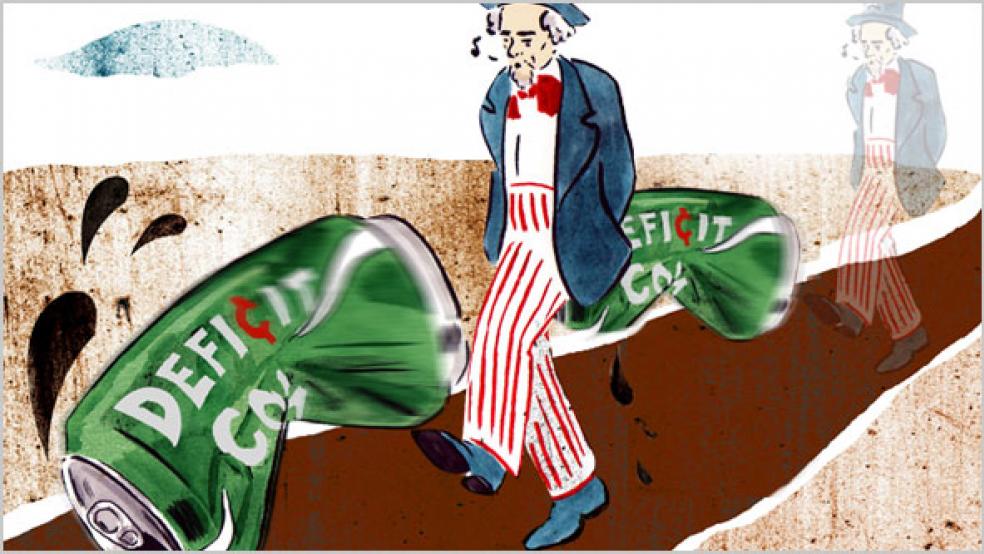With little more than three weeks before a bipartisan “Super Committee’s” deadline to produce a deficit reduction plan, four prominent budget experts stepped up calls for a grand bargain that goes well beyond the mandate to find $1.2 trillion savings over 10 years.
The 12-member panel has been struggling for weeks to find some common ground on spending cuts and tax increases, with little to show for it. But the experts didn’t mince words in warning of disastrous consequences if the committee fails, including a repeat of last summer’s downgrade of the U.S. credit rating. “Collectively, I’m worried you are going to fail the country,” said Erskine Bowles, President Clinton’s former chief of staff and co-chair of thePresident Obama’s national fiscal commission last year. Bowles said the four major sources of the nation’s ballooning deficit include the costs of health care, defense spending, the “ineffective” tax system and interest on the national debt – and all must be addressed.
“The debt problem can’t be solved by just raising taxes or by just cutting spending,” Bowles said at a three hour public hearing Tuesday afternoon. “I think you all have proven that over the last year.”
The committee is deadlocked over Democrats’ insistence on including revenues increases as part of the deficit reduction package, over strong Republican insistence that tax increases are “off the table.” Instead Republicans say they want to overhaul the tax code in a revenue neutral way and have focused on cuts to healthcare benefit programs. Previous negotiations between the White House and congressional Republicans and Democrats collapsed over taxes.
Bowles and former Republican Senator Alan Simpson, co-chair of the President’s fiscal commission, told the panel to “go big” with a $4 trillion deficit reduction package over the coming decade. They said it would be the “minimum” level of savings needed to keep the nation’s debt from rising faster than economic growth. The co-chairs said the panel should take a two-step approach: enact some savings immediately and legislate additional savings later.
“It is supremely important that the committee succeed—for the sake of our economy and public confidence in their leaders,” they said in joint written testimony. Failure to find an agreement would risk another credit downgrade and rattle financial markets, they said. In August, several days after Congress agreed to raise the debt ceiling after protracted and contentious talks, Standard & Poor’s cut the nation’s bond rating for the first time in history, causing a shake-up in the U.S. financial system.
If the committee fails to reach a deal before the November 23 deadline, $1.2 trillion in automatic across-the-board cuts will kick in. A simple majority of seven votes is required for the deal to pass. Congress must approve the plan with an up-or-down vote by December 23.
Despite the warnings, Moody’s Investor Services said on Tuesday that failure by the committee to reach a broad agreement would be seen as a negative, but it would not lead to a credit rating change itself. Currently Moody’s rates U.S. credit as AAA, but the outlook on the rating is negative. Meanwhile, Alice Rivlin, former budget director under President Clinton, and former Senate Budget Committee Chairman Pete V. Domenici, R-N.M., urged the Super Committee to adopt a three-step process of at least $4 trillion in savings over 10 years to tame the nation’s spiraling deficit.
“Let me be blunt,” Domenici told the panel. “A plan that does not fundamentally restructure Medicare and other health entitlements will fail to adequately address the debt crisis that we face.”
Domenici and Rivlin, who co-chaired their own deficit reduction commission last year, said the plan should include a full payroll tax holiday for both employers and employees to help spur the economy. It should also include legislation for further reforms to the tax system and Medicare. Senate Finance Committee Chairman Max Baucus, D-Montana, indicated he supported turning over writing specific tax reform measures to specialized congressional committees since time is running out.
Rivlin repeated a warning that Super Committee failure could result in a double-dip recession and a lost decade of growth. She likened the U.S. deficit situation to that of the European sovereign debt crisis where seemingly solid countries quickly collapsed under a mountain of debt.
While their deficit reduction recommendations varied, all four budget hawks suggested sacred cows would have to face the chopping block. They said members on the panel should focus less on the political climate and more on the potential economic consequences should the committee fail. All said that in order to reduce the deficit, spending cuts must be partnered with raising revenue.
"People admire guts and courage," Simpson said. "They may fight you. They may vilify you. They will admire you."
Co-chair Jeb Hensarling, R-Texas., said that he supported the recommendations to “Go Big” and reiterated his position that a grand bargain needs to include reforms to health care and retirement programs. “Certainly we cannot tax our way out of this crisis,” Hensarling said in his opening statement. “We cannot solve it by tinkering around the edges of our entitlement programs.”
Earlier on Tuesday, Reuters reported that that a group of six members—three Democrats and three Republicans—within the committee have started to meet separately to try find savings between $1.2 trillion and $1.5 trillion in an effort to broker a bipartisan deal. The six lawmakers--Republicans Rob Portman, Dave Camp and Fred Upton; and Democrats John Kerry, Max Baucus and Chris Van Hollen—are seeking a smaller deal because they recognize the gap between the two parties on taxes and spending is too wide.
Last week Democrats on the Super Committee unveiled a $3 trillion package over the next decade which includes $1.3 trillion in new tax-based revenue. Republicans were quick to declare it “not serious”.
Republicans rolled out their own $2.2 trillion deficit reduction package that would trim $640 billion from the national deficit by increasing fees and Medicare co-pays. Democrats rejected the plan as unworkable.





